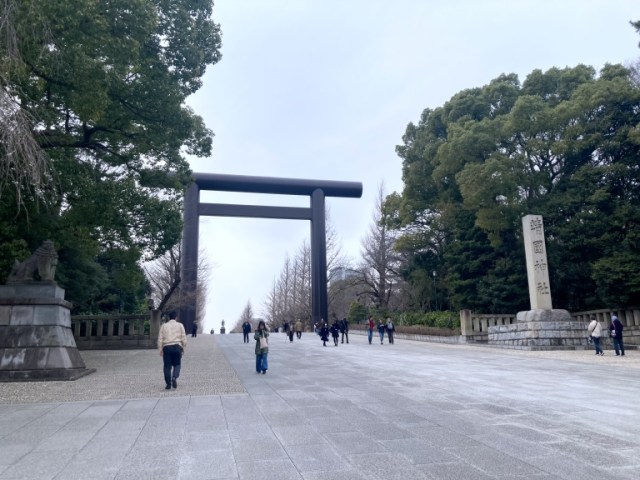
Sentence handed down to 29-year-old Chinese man for spray-painting Yasukuni Shrine.
Back on May 31, a Chinese-national living in Japan stopped by Yasukuni Shrine in Tokyo (pictured above). While there, he pulled out a can of red spray paint and wrote, in English, the word “toilet” on one of the shrine’s stone pillars.
The 29-year-old man, named Jiang Zhuojun, was identified and indicted in July, and the Tokyo District Court has now handed down a ruling in his trial, finding him guilty of disrespecting a place of worship and damaging property. Jiang’s sentence was issued on December 25, and the court wasn’t swayed by any atmosphere of Christmas cheer, as he’s now been sentenced to eight months in prison.
We should take a moment here to discuss the cultural/societal significance of Yasukuni Shrine. Located in downtown Tokyo’s Chiyoda Ward, the shrine was founded in 1869 to recognize Japanese soldiers who died while fighting for the country’s armed forces. This includes those who died fighting in World War II, a point which has made Yasukuni Shrine a target of criticism from citizens of China, Korea, and other countries that were on the receiving end of Japan’s campaigns of military expansion during the first half of the 20th century. By extension, Yasukuni Shrine is also sometimes seen by individuals from other Asian nations as a symbol of political tensions or disputes between their country’s government and Japan, though the shrine isn’t necessarily considered by Japanese people to be a symbol of the Japanese government.
It’s also worth noting that while Yasukuni is often briefly summarized in international media reports as “a shrine that houses the spirits of Japanese war criminals from World War II,” and it is true that the shrine’s record of names includes 1,066 war criminals, there are also 2.4 million other soldiers, including those who died in conflicts other than World War II, who are recognized by the shrine.
▼ Yasukuni Shrine is also, incidentally, where Tokyo’s sample sakura tree, used to measure the official start of sakura season in the city, is located.
The question of what exactly Yasukuni symbolizes is, undeniably, a complex one, and one that doesn’t have a single, definitively correct answer, even in the minds of the Japanese people. However, that’s all the more reason to not expect leniency from the Japanese justice system regarding acts of vandalism at the shrine.
During the trial, Jiang said he was motivated not by feelings of resentment for Japan’s military aggression towards China during World War II, but to show his opposition to Japan’s releasing of water from Fukushima Daiichi Nuclear Power Plant into the ocean, a process which has been approved by the International Atomic Energy Agency as consistent with international safety standards. In handing down Jiang’s sentence, the court said “Though [the defendant] has stated that his motive was to protest the release of the treated water in order to protect the ocean, it is not at all permissible for him to make his assertions by committing illegal acts.” No mention has been made of the punishment being a suspended sentence/probation sort of arrangement, either, so it looks like Jiang will indeed be spending time behind bars.
Jiang’s sentencing serves as an important reminder that it’s foolish to expect that foreign-citizen status will guarantee a softer punishment for crimes committed in Japan. Vandalism might seem like the sort of thing for which prosecutors would be more likely to push for a swift and quiet deportation, but this case shows that getting locked up is very much a possibility too.
Source: Nitele News via Hachima Kiko, International Atomic Energy Agency
Photos ©SoraNews24
● Want to hear about SoraNews24’s latest articles as soon as they’re published? Follow us on Facebook and Twitter!